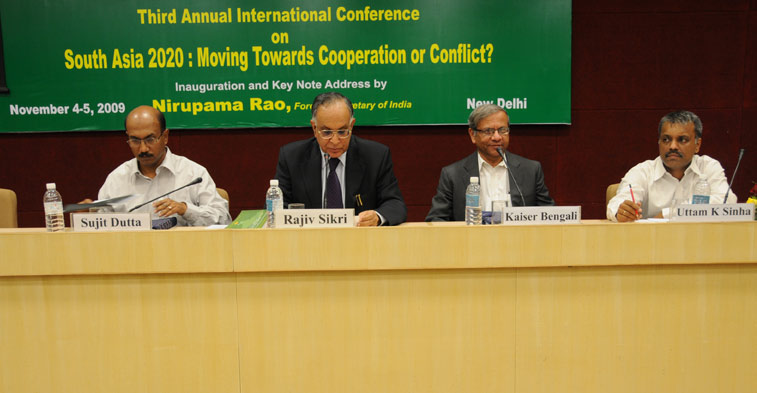You are here

Rapporteur Report on Session II
November 4, 2009
Regional Approach to a Cooperative Future
The theme of the second session of the Conference was “Regional Approach to a Cooperative Future”. Each of the three papers presented in the session underscored the importance of enhancing regional cooperation in the future. The session had three speakers – Prof. Sujit Dutta, Dr. Kaiser Bengali and Dr. Uttam Sinha, and it was chaired by Ambassador Rajiv Sikri.
Prof. Sujit Dutta in his paper titled South Asian Regional Security Architecture: Creating Order from Anarchy argued that the lack of substantial regional cooperation in South Asia is a result of divisive domestic politics. Such domestic politics, characterized by an ideological enemy-oriented competition among the elites, weak governance and identity-based conflicts has cast its shadow on thinking about regional security. It has prevented a region that qualifies naturally as a regional security complex, from constructing a viable regional order. This has often resulted in an anti-India bandwagon at the regional level. He identified three main challenges to the emergence of regional security order: first, the lack of elite consensus on regional cooperation; second, the lack of a shared normative order; and third, the lack of a regional approach towards the world at large. He argued that a domestic order based on the norms of democracy, secularism, federalism and welfare state is the key to the creation of a stable, cooperative regional order that could evolve into a security community.
Defending his characterization of anti-India “entities” in each of India’s neighbouring countries, Dutta asserted that such forces were not only anti-Indian, but their ideologies were also against the formation of a robust regional order. Thus they were detrimental to the growth of regionalism in South Asia. He also contended that Pakistan had a highly offensive concept of security, and that a more constructivist model will help strengthen regional cooperation.
Dr. Kaiser Bengali in his paper on Changing Pattern of Security Threats: Time for Realignment made a case for a new regional approach that would strengthen democratic forces in each country. Elaborating on his thesis in the context of Pakistan, he argued that his country was distinctly divided into two sections - “establishment Pakistan” and “democratic Pakistan”. As the predominant country in the region, he hoped that India would make a distinction between the two and adopted nuanced policies that would strengthen democratic Pakistan. He argued that the boundaries that divide the two countries are no longer geographical; rather they are ideological and intellectual. Such boundaries pitched the democratic forces of the two countries against the extremists. He concluded with the hope that democratic elements in India and Pakistan would come together to defeat the extremists.
Bengali’s thesis on establishment Pakistan versus democratic Pakistan elicited several comments and questions. He agreed with those who argued that the struggle for democracy in Pakistan must be fought by the democratic forces within Pakistan, but reasserted that sensitivity on the part of India in its policy decisions towards Pakistan would strengthen the hands of the democratic forces in Pakistan. He recounted how the timing of the reduction in water supply to Pakistan due to the construction of the Baglihar dam affected the production of wheat in Punjab and strengthened the voice of establishment Pakistan. This, he said, was very important because there was clear division between the state and civil society in Pakistan, and the costs of the conflict with India were often borne by civil society. Commenting on the current state of politics in Pakistan, he clarified that today “establishment Pakistan” consisted of those living along the Grand Trunk Road connecting Lahore to Rawalpindi and that they perpetuate several myths to ensure that they control state power.
Focusing on an emerging aspect of regional tension, Dr. Uttam Sinha in his paper entitled Sharing Common Rivers: Is it a Source of Cooperation or Conflict? argued that riparian relations are likely to emerge as causes of regional conflict. India, which would play the role of an upper-riparian, middle-riparian and lower riparian state vis-à-vis different countries, would thus be the principle actor in the hydrological regime in the region. Water sharing is likely to be used as a bargaining tool in India-Pakistan relations as also in Sino-Indian relations. In comparison, water sharing between Nepal and Bangladesh is likely to be less determined by political considerations. He pointed out that new knowledge of climate change and hydrological scarcity and its linkages with food and energy security may require a reformulation of existing water-sharing treaties among the countries of the region. This in turn would make water a source of cooperation rather than conflict.
Responding to queries on China’s impending policy on reversing the flow of Tibetan rivers, Sinha argued that the issue must be raised internationally as part of the debate on the use of the global commons. He affirmed that Chinese actions would be critical to cooperation on water in South Asia and therefore India must have a clear position on how it should respond to the proposed diversion of rivers by China.
In his concluding remarks, Ambassador Rajiv Sikri highlighted the following salient points that emerged as challenges to regional cooperation in the years to come:
- issues of identity and ideological conflict
- absence of a common regional security perspective
- necessity of subjecting elites to democratic discipline
- lack of visionary leadership
- the need for India and Pakistan to work together, pending the resolution of the Kashmir issue
- the need for the region to accord due attention to issues beyond the India-Pakistan dyad
Prepared by Dr. Arpita Anant, Associate Fellow at the Institute for Defence Studies and Analysis
